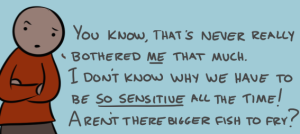
Source: Huffington Post
It wouldn’t leave me. It gripped me and released me and gripped me again. It pierced itself in and out of my mind until I finally became one with it, until I was no longer just angry, but anger itself.
And once I became an unleashed beast, pleasure came riding along.
Sometimes the pleasure of being the one who has been wronged has no match.
Words that accuse someone else sound as if they are dipped in a pond overflowing with sweetness, and all scattered thoughts come together to shield you – the one who has been wronged.
Last month, I was the one who was wronged.
I don’t remember if I had tears to accompany me, but I did have anger’s warm embrace. Like a friend who shows up at your doorstep because you made a 2am phone call, it was there.
Days passed, and it was still there by my side, holding me tight, making sure I remembered that I was mistreated.
It felt good. Who wouldn’t want a friend like that who would stand up for you and never leave? I was anger, and I was my own friend.
But soon I realized that I’d been waking up every morning just so that I could start being angry again for something that happened days ago. Being angry became a chore.
As I kept remembering harsh things from the past and kept complaining in the present, I became frustrated.
That’s when I realized that what happened a few days ago had ended, and what was now happening was a new kind of wrong in which I was not just the one who had been wronged, but the one who had wronged.
Unconsciously, I was conspiring to be a victim.
I knew the anger had to end right at that moment, or I would be trapped in innumerable self-wrongs. Once the realization of reality seeped in, there was no way for anything unreal to survive.
Often with such realization comes the power to make authentic choices. I chose to end the anger.
And its end wasn’t wild or destructive; it was as peaceful and as intelligent as walking away from an angry person.
And I think that many of us have been here before – have felt this pain, have known this frustration. So if you find yourself in a situation where anger is poisoning your life, here are a few tips that might help you to end it.
1. Accept What Happened
Did your friends bail on you? Maybe they asked you to come over for a chat, but then got busy and asked you to leave. You’re furious because you just drove all the way from your house to their place in the maddening traffic – and because you feel that they have no respect for your time or your schedule, or worse, your feelings.
Being taken for granted seems unacceptable. But that is not what you’re supposed to accept at the moment. Mental labels or interpretations of events are hard to accept because they are mental labels and interpretations, not reality. One can only accept reality.
So, you accept the situation, the facts.
Instead of thinking “How could they do this to me?” accept that they did. Attach no more information to that fact.
2. Question Your Purpose in Sharing Your Emotions
It’s an unbelievably amazing feeling to call up someone and tell them how you’ve been wronged. I know that feeling, that rush of righteousness when sympathies pour in to justify your anger.
They say talking about your feelings helps and if not talking, at least writing about it in your journal surely does help.
And it might help some people, but the question is: Does it help you?
When I was angry last month, I talked about it and I wrote about it in my journal, but it didn’t help me because I was still angry.
Here’s the reason why it will work for some people and won’t work for some others like me – purpose.
Is your purpose to get yourself out of anger, or to get something out of your anger?
If you’re stuck in the latter, it might help to shift your consciousness toward the former.
3. Observe Your Mind
The non-stop commentary that was going on in my head was making too much noise, and I wanted it to quiet down.
Something in me kept telling me to feel more and more betrayed and unhappy, so that it could thrive. My mind’s continuous justification of anger turned out to be the cause of all unhappiness that I was experiencing.
Observe your mind.
What is it saying? Is it reminding you of past wrongs that were done to you? Does it enjoy making you miserable and negative? Does your hate-list suddenly expand?
See if there is something in you that likes even slightly the sorry story of yours. Remember when you are angry, your mind is not your friend.
4. Make a Different Choice
The kinds of choices that we make when we are angry look something like this:not answering phone calls, avoiding people, snapping at people who did nothing wrong, sleeping too much or too little, eating too much or too little, complaining, banging the door shut, and even throwing things instead of just placing them in their place.
Once I realized how anger had been dictating my choices, I made sure to see it as a separate entity from me.
Although it was an emotion inside me, it was not me.
Once I knew this, I could make choices that the angry entity wouldn’t make.I could choose to not complain and not throw things around. I could choose to not create more negativity by talking endlessly about what happened.
Make a choice different from what the anger in you wants you to make.
5. Do the Next Right Thing
Now that you can observe your mind and know that you are not your anger, what feels like the next right thing to do?
Don’t think purposely what the next right thing would be, rather let it come to you in the form of a feeling, not a thought.
To know how to tell the “next right thing to do” from a random thought, see if there is still any resentment in you as a result of some underlying anger.
Do you still complain in your head? If yes, go back to observing your mind until you can see yourself and the anger as two separate entities.
Once you can see that, the next right thing to do will come to you effortlessly.
Maybe you will feel like forgiving, or maybe you will take a break from that person. Maybe you will talk to them about what they did, or maybe you will never bring it up again.
To me, the next right thing to do was to never bring it up again because I was no longer disturbed by that event. I could let it go and forgive.
What is the next right thing for you?
***
The anger that follows being on the receiving side of an unfair treatment is justified by our mind because it is perhaps the most expected and accepted emotion in our societies. When hurt, we are allowed to be angry as much as we want.
But soon, it so happens that the pond no longer seems to overflow with sweet pleasure; instead, it refills with poison until we realize that we’re drowning in it and want to get out of it.
So the next time that you get angry, try to see how long that anger stays in you.
Are you willing to offer a permanent rental space for a feeling so toxic?
Remember: People will wrong you, but the anger in you will do much worse.
[do_widget id=”text-101″]
R. Nithya is a Contributing Writer for Everyday Feminism and lives in New Delhi, India. She has a Bachelor’s in Journalism and a Master’s in Political Science and has worked as a reporter with an online political news and analysis magazine. She enjoys reading books while traveling on the metro, writing poetry on sleepless nights, and engaging in conversations on politics, feminism, and spirituality. These days she is practicing patience and presence. Visit her here or follow her on Twitter @rnithya26.
Search our 3000+ articles!
Read our articles about:
Our online racial justice training
Used by hundreds of universities, non-profits, and businesses.
Click to learn more




















